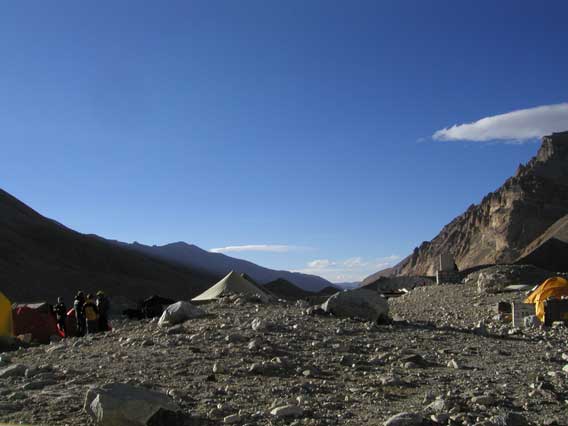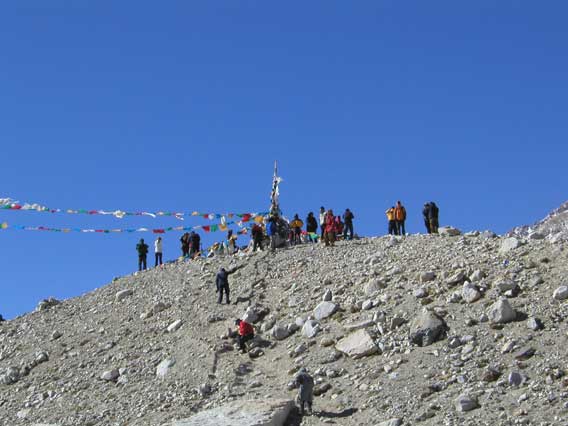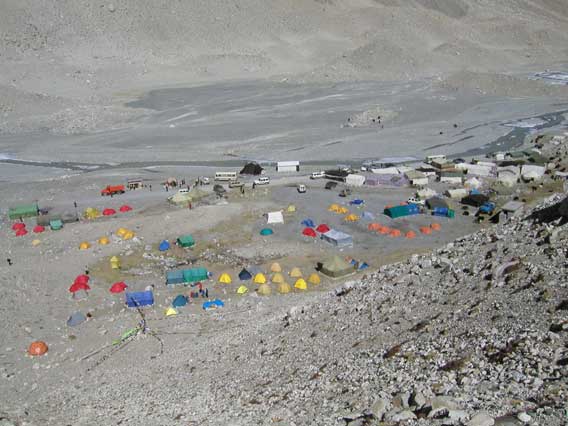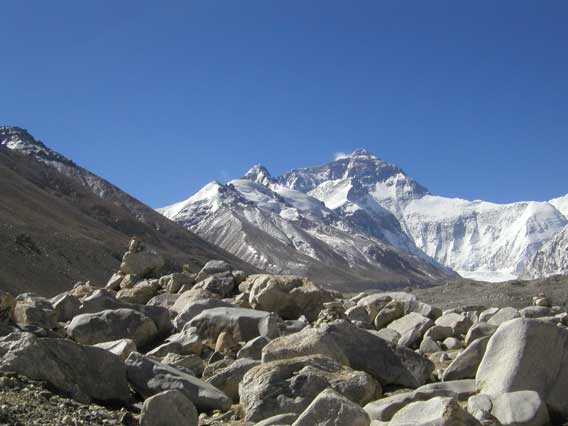Rest at base camp 5170m/17000ft, 29.04 - 05.05.
29.04.2004, High winds.
Pemba and the kitchen boy went down to Dingri last night. My expedition seems to have stalled: one Sherpa is in Dingri and no one knows when, or even if, he will return, and the other is sitting around at base camp. Between them, they have made only two carries to Camp 1 whereas David has made four.So I searched out Kancha in the Tibetan quarter of the base camp, and we had a little chat. Next morning he left at 6:30am for ABC. He said that, even without Pemba, he can have the camps set up in time for us to leave for the summit about May 10.
[Kancha is 42 and, although he has been very high many times of Chomolungma, he has never been to the top. He says he is very keen to get there before he is too old. He is from Kumjung, which is one of the highest year-round Sherpa village.]
30.04.2004, High winds.
The kitchen boy at base camp is Tibetan, so I had the cook ask him what Chomolungma meant. The answer was long and animated, but the cook (who is a Sherpa) said he didn't know enough English to be able to translate it. [Later he said Chomo means cow in Tibetan, as it does in Sherpa.]01.05.2004, High winds.
For 1000 rupees (about $14) the cook has bought a solar panel connected to a battery/transformer and a fluorescent bulb, so now we have light in the dining tent. He plans to take them home to his village, where there is no electricity.Pemba arrived back, recovered from his illness. He will go up to ABC tomorrow. The kitchen boy is still at Dingri, but is recovering.
An American tourist comes into our tent and asks where the taxi down to the Rongbuk monastery leaves from (good luck).
Six of the Greeks arrive down. Their doctor has returned to Kathmandu, claiming illness.
02.05.2004, High winds.
The Austrian group arrives down.
03.05.2004, High winds.
At breakfast, one of the Greeks, who is completing a Ph.D. in high-altitude physiology, was measuring the arterial oxygen saturation of his team members. He said that for acclimatized individuals at 5000m it was typically in the 70s, but for his team members and their Sherpas it was in the upper 80s. Mine was 90%. [A reading below 95% at sea level means you are gravely ill.]
He said that doctors still have no way of predicting who will perform well at high altitude from measurements made at sea level. Perhaps one day they will discover a high altitude gene.
The Greeks went down to stay in the new hotel near the Rongbuk monastery, and two of the Spanish, Sylvia and Marisa, arrived down from ABC. They said that the winds had been very bad at ABC. Few were going to Camp 1, and no one was going above it.
To my surprise, the kitchen boy arrived back from Dingri, and said he was going to ABC tomorrow.
04.05.2004, High Winds.
Today, the wind seems even stronger, but by late afternoon it had calmed, and for the first time since I had arrived back at base camp, the weather was (briefly) beautiful.
The view down valley from my tent at 5pm.
Hugues and Maryse came down. They had spent a night at Camp 1 but had been unable to go higher because of the high winds. Kancha blames the continual high winds on the presence of so many women on the mountain.
The forecast is for somewhat lighter winds for the next three days, and then a return to high winds.
05.05.2004, High winds.
It was calm in the morning, but by 8:30am the wind had returned. During the night, the Austrian group left to spend a few days in Kathmandu.
Early each morning, tourists would arrive, climb this small hill (one
used oxygen), take photos, and then vanish again.

Every day while at base camp, I would go for a walk up the hill behind the camp.

Chomolungma was always a brooding presence.
Tomorrow I will go back to ABC even though it appears that it will not be possible to make a summit attempt for several days.